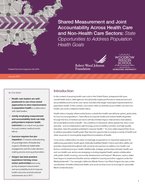0
Publication
Community:
Jan 18, 2024
Marjorie Sims, Sarah Haight
January 2024
Focused on the 23,306 young parents (ages 18 to 24) and their families in New Mexico, this report provides a framework for organizations in New Mexico to collaborate more effectively and offers a plan of action to assess these efforts and strengthen impact for families.
This publication aims to deepen understanding about the demographics, aspirations, and needs of young parents; highlights practices and policies aligned with a two-generation (2Gen) approach; showcases opportunities to streamline this work by forging connections between organizations and state systems; and offers recommendations across sectors and at all levels.
Suggested Reference: Suggested Reference: Sims, M. & Haight, S. (2024). Meeting Young Parents Where They Dream: A Collaborative Framework for a 2Gen Approach in New Mexico. Washington, DC.
Authored by: Marjorie Sims, Sarah Haight
Topics: Child welfare, Dual-generation, dual-generation initiative, Early childhood, Family engagement, Healthy homes, Housing
 Shared by Molli Caite Hughes
Shared by Molli Caite Hughes
Molli Caite Hughes posted a
on Jan 18, 2024
Marjorie Sims, Sarah Haight
Marjorie Sims, Sarah Haight
January 2024
Focused on the 23,306 young parents (ages 18 to 24) and their families in New Mexico, this report provides a framework for organizations in New Mexico to collaborate more effectively and offers a plan of action to assess these efforts and strengthen impact
0
Policy Brief
Community:
Oct 12, 2022
Disabled individuals and families in federally assisted housing face multiple challenges in gaining access to housing units and services that meet their needs—despite legal frameworks meant to help them. This brief focuses on working-age disabled individuals and families with a disabled household member who live in federally assisted housing. It presents evidence of the challenges with federally assisted housing processes and supports for residents with disabilities, and provides recommendations that could help these processes and supports better meet legal obligations and resident needs.
Authored by: Corianne Payton Scally, Ebonie Megibow, Susan J. Popkin for the Urban Institute
Topics: Disabilities, Family engagement, Housing
 Shared by Sandra Ware
Shared by Sandra Ware
Sandra Ware posted a
on Oct 27, 2022
Corianne Payton Scally, Ebonie Megibow, Susan J. Popkin for the Urban Institute
Disabled individuals and families in federally assisted housing face multiple challenges in gaining access to housing units and services that meet their needs—despite legal frameworks meant to help them.
0
Video
Community:
Jun 17, 2022
When public libraries and public housing authorities intentionally join forces, the benefits are real and lasting for those living in public housing. This session highlights the partnership between Cuyahoga Metropolitan Housing Authority (CMHA) and Cleveland Public Library (CPL). CMHA and CPL executive leaders will discuss how their agencies strategically aligned their vision for impact and are meeting community needs through the library’s free and accessible resources. CMHA and CPL leaders will also share strategies for creating effective cross-sector partnerships that can drive greater economic mobility and better education and
health outcomes for individuals and families.
Authored by:
Topics: Advocacy, Asset building, CLPHA, Education, Family engagement, Homelessness, Housing, Legislation & Policy, Literacy, Low-income, Supportive housing
 Shared by Karina George
Shared by Karina George
Karina George posted a
on Jun 17, 2022
When public libraries and public housing authorities intentionally join forces, the benefits are real and lasting for those living in public housing. This session highlights the partnership between Cuyahoga Metropolitan Housing Authority (CMHA) and Cleveland Public Library (CPL).
0
Video
Community:
Jun 17, 2022
The Vancouver Housing Authority collaborated with a Federally Qualified Health Center and a homeless crisis response system to develop a network of scattered-site and site-based supportive housing. This moderated discussion will cover how VHA paired Housing Choice Vouchers and public housing with a Medicaid-funded supportive housing benefit to serve people identified by the community’s Coordinated Entry as needing supportive housing. Speakers will also discuss the challenges faced through the process, model adjustments made, and evaluation of the work through matching housing data and Medicaid utilization data.
Authored by:
Topics: Advocacy, CLPHA, Data sharing, Family engagement, Health, Healthy homes, Homelessness, Housing, Legislation & Policy, Low-income, Research, Stability, Sustainability
 Shared by Karina George
Shared by Karina George
Karina George posted a
on Jun 17, 2022
The Vancouver Housing Authority collaborated with a Federally Qualified Health Center and a homeless crisis response system to develop a network of scattered-site and site-based supportive housing.
0
Video
Community:
Jun 17, 2022
Housing providers are uniquely positioned to find innovative and meaningful ways to engage residents with lived experience in program design and implementation to ensure investments are focused, efficient, and culturally appropriate. Learn how the King County Housing Authority in Washington and The Community Builders in Cincinnati, OH are responding to the needs and desires of their residents in new ways that leverage the assets and strengths of their residents to ensure that young children thrive. Attendees will leave this session with new ideas to incorporate resident input in early childhood programming to make it more effective.
Authored by:
Topics: Advocacy, CLPHA, Education, Family engagement, Housing, Low-income, Research, Supportive housing, Sustainability
 Shared by Karina George
Shared by Karina George
Karina George posted a
on Jun 17, 2022
Housing providers are uniquely positioned to find innovative and meaningful ways to engage residents with lived experience in program design and implementation to ensure investments are focused, efficient, and culturally appropriate.
0
Video
Community:
Jun 17, 2022
This session will review the extent to which local jurisdictions engaged with school districts in the 2016-17 Affirmatively Furthering Fair Housing (AFFH) process and preview the potential for PHAs to engage with school districts and school data in the upcoming renewal of the HUD AFFH process.
Authored by:
Topics: Advocacy, Attendance, CLPHA, Data sharing, Education, Family engagement, Housing, Legislation & Policy, Research, Sustainability
 Shared by Karina George
Shared by Karina George
Karina George posted a
on Jun 17, 2022
This session will review the extent to which local jurisdictions engaged with school districts in the 2016-17 Affirmatively Furthering Fair Housing (AFFH) process and preview the potential for PHAs to engage with school districts and school data in the upcoming renewal of the HUD AFFH process.
0
Video
Community:
Jun 17, 2022
The Low Income Investment Fund (LIIF) will moderate a unique cross-sector panel of housing and early care and education (ECE) experts on strategies and best practices for co-locating ECE facilities within affordable housing developments. Discussion of specific financing techniques and site design considerations from existing co-located facilities will provide attendees lessons on policy and programmatic changes needed to incentivize co-location. Panelists include innovators in affordable housing development, government and public sectors, early care and education operations, and community development finance.
Authored by:
Topics: Advocacy, Broadband, Child welfare, CLPHA, Family engagement, Food insecurity, Health, Housing, Legislation & Policy, Low-income, Nutrition, School-readiness, Supportive housing, Sustainability
 Shared by Karina George
Shared by Karina George
Karina George posted a
on Jun 17, 2022
The Low Income Investment Fund (LIIF) will moderate a unique cross-sector panel of housing and early care and education (ECE) experts on strategies and best practices for co-locating ECE facilities within affordable housing developments.
0
Publication
Community:
Jun 17, 2021
Authored by: U.S. Department of Housing and Urban Development Choice Neighborhoods
Topics: Attendance, COVID-19, Early childhood, Education, Family engagement, Housing, Low-income, Out-of-school time, Youth
 Shared by Kirsten Greenwell
Shared by Kirsten Greenwell
Kirsten Greenwell posted a
on Jun 17, 2021
U.S. Department of Housing and Urban Development Choice Neighborhoods
0
Webinar
Community:
Jun 11, 2019
CLPHA’s Education Working Group convened on Tuesday, June 11 to learn about one of the Housing Authority of Kansas City’s (HAKC) newest housing communities: Pemberton Park, a subsidized apartment building that serves grandparents caring for grandchildren. Representatives from HAKC and their partners discussed the process of establishing the grand-family complex, as well as challenges and successes they experienced along the way.
Authored by: CLPHA, Housing Is
Topics: Education, Family engagement, Housing, Housing Is Working Group, Low-income, Partnerships, Seniors, Youth
 Shared by Housing Is
Shared by Housing Is
Housing Is posted a
on Jun 11, 2019
CLPHA’s Education Working Group convened on Tuesday, June 11 to learn about one of the Housing Authority of Kansas City’s (HAKC) newest housing communities: Pemberton Park, a subsidized apartment building that serves grandparents caring for grandchildren.
0
News Article
Community:
Recognizing that the aging of its population will reshape housing needs, the city of Washington, DC, has fostered numerous options for older residents, including some that are intentionally multigenerational.
Authored by: PD&R Edge Online Magazine
Topics: Early childhood, Family engagement, Housing, Low-income, Seniors, Youth
 Shared by Housing Is
Shared by Housing Is
Housing Is posted a
on Jun 11, 2019
PD&R Edge Online Magazine
Recognizing that the aging of its population will reshape housing needs, the city of Washington, DC, has fostered numerous options for older residents, including some that are intentionally multigenerational.
0
Publication
Community:
April is National Child Abuse Prevention Month, an opportunity to recognize the importance and raise awareness of our roles —families, communities, service providers, researchers, policy makers and others— in working together to prevent child abuse and neglect and to promote the overall social, physical, and emotional well-being of children and their families.
Authored by: Jasmine Hayes for CSH
Topics: Child welfare, Family engagement, Health, Homelessness, Housing, Safety
 Shared by Housing Is
Shared by Housing Is
Housing Is posted a
on Apr 17, 2019
April is National Child Abuse Prevention Month, an opportunity to recognize the importance and raise awareness of our roles —families, communities, service providers, researchers, policy makers and others— in working together to prevent child abuse and neglect and to promote the overall social, phys
0
Publication
Community:
To better align families’ child welfare and supportive housing needs, child welfare leaders must clearly present their vision for the role of supportive housing as a part of positive child welfare outcomes. State administrators and leaders must consider critical aspects of housing within the Family First IV-E Prevention Program Five-Year State Plan (State Plan) and introduce necessary state policy, legislative, and budgetary changes to ensure that stable, supportive housing is central to long-term family stability and well-being
Authored by: CSH
Topics: Child welfare, Family engagement, Housing, Legislation & Policy, Supportive housing
 Shared by Housing Is
Shared by Housing Is
Housing Is posted a
on Apr 12, 2019
To better align families’ child welfare and supportive housing needs, child welfare leaders must clearly present their vision for the role of supportive housing as a part of positive child welfare outcomes.
0
Publication
Community:
The Keeping Families Together model turned the usual paradigm for prioritizing affordable housing on its head. Rather than targeting the most “stable” families, Keeping Families Together sought out families with the most complicated cases—those at greatest risk. Thanks to this approach, families once on the brink of crisis now have a permanent place to call home, as well as the services and support they need to stay together.
Authored by: CSH
Topics: Child welfare, Family engagement, Homelessness, Housing, Low-income, Partnerships, Research, Supportive housing
 Shared by Housing Is
Shared by Housing Is
Housing Is posted a
on Apr 4, 2019
The Keeping Families Together model turned the usual paradigm for prioritizing affordable housing on its head. Rather than targeting the most “stable” families, Keeping Families Together sought out families with the most complicated cases—those at greatest risk.
0
News Article
Community:
Jan 10, 2019
Island School is one of 247 “community schools” in New York. These are regular public schools, with a twist. They have longer days and longer school years: Island stays open 12 hours a day, six days a week, including spring and winter breaks as well as the summer. A psychologist makes weekly rounds. A dentist comes by regularly. So does an optometrist, and students who need glasses get them free.
Authored by: David L. Kirk for The New York Times
Topics: Community development, Dual-generation, East Coast, Education, Family engagement, Homelessness, Housing, Low-income, Mental health, Metrics, Partnerships, Stability, Youth
 Shared by Mica O'Brien
Shared by Mica O'Brien
Mica O'Brien posted a
on Jan 10, 2019
David L. Kirk for The New York Times
Island School is one of 247 “community schools” in New York. These are regular public schools, with a twist. They have longer days and longer school years: Island stays open 12 hours a day, six days a week, including spring and winter breaks as well as the summer.
0
Publication
Community:
Dec 1, 2018
With collectively more than 100 years of policy expertise and values-based leadership between us, Ascend at the Aspen Institute and the Housing Opportunity and Services Together initiative at the Urban Institute partnered to develop a set of recommendations on how to harness assisted housing and public-private housing partnerships for better outcomes for families.
Authored by: The Urban Institute and ASCEND: The Aspen Institute
Topics: Dual-generation, Early childhood, Education, Family engagement, Health, Housing, Low-income, Place-based, Research, Stability
 Shared by Mica O'Brien
Shared by Mica O'Brien
Mica O'Brien posted a
on Dec 6, 2018
The Urban Institute and ASCEND: The Aspen Institute
With collectively more than 100 years of policy expertise and values-based leadership between us, Ascend at the Aspen Institute and the Housing Opportunity and Services Together initiative at the Urban Institute partnered to develop a set of recommendations on how to harness assisted housing and pub
0
Publication
Community:
Nov 28, 2018
Housing instability among families and children can be detrimental to child welfare, health, economic, and other outcomes. Policymakers and service providers in these fields should consider weaving housing into their approaches. Treating instability at its roots can relieve the trade-offs and stress that emerge when no decent housing is affordable. Evidence indicates that affordable housing can improve a range of outcomes for families and—in combination with short-term or long-term services—help providers tackle complex challenges head-on.
Authored by: Aaron Shroyer for The Urban Institute
Topics: Child welfare, Family engagement, Housing, Low-income, Stability, Supportive housing
 Shared by Mica O'Brien
Shared by Mica O'Brien
Mica O'Brien posted a
on Nov 29, 2018
Aaron Shroyer for The Urban Institute
Housing instability among families and children can be detrimental to child welfare, health, economic, and other outcomes. Policymakers and service providers in these fields should consider weaving housing into their approaches.
0
Report
Community:
Oct 3, 2018
More than a third of homeless people are part of a family, most of which are headed by women with at least one child. Homeless families are different from single homeless people, and their needs differ. But limited research focuses on these families. This study aims to fill the gap by exploring longitudinal health service use and expenditures for homeless family members before and after entering an emergency shelter.
Authored by: Robin Clark, Linda Weinreb, Julie Flahive, and Robert Seifert for the American Journal of Public Health
Topics: Family engagement, Health, Homelessness, Housing, Low-income, Preventative care, Research, Stability
 Shared by Mica O'Brien
Shared by Mica O'Brien
Mica O'Brien posted a
on Nov 21, 2018
Robin Clark, Linda Weinreb, Julie Flahive, and Robert Seifert for the American Journal of Public Health
More than a third of homeless people are part of a family, most of which are headed by women with at least one child. Homeless families are different from single homeless people, and their needs differ. But limited research focuses on these families.
0
Policy Brief
Community:
Oct 24, 2018
On Wednesday, October 24, President Trump signed into law bipartisan legislation, H.R. 6, the SUPPORT for Patients and Communities Act. This sweeping legislation contains many provisions that could help children, youth, and families experiencing homelessness who are impacted by the opioid crisis, as well as provisions to help all children and youth who experience trauma.
Authored by: SchoolHouse Connection
Topics: Child welfare, Dual-generation, Early childhood, Family engagement, Housing, Legislation & Policy, Low-income, Substance abuse, Supportive housing
 Shared by Mica O'Brien
Shared by Mica O'Brien
Mica O'Brien posted a
on Oct 31, 2018
On Wednesday, October 24, President Trump signed into law bipartisan legislation, H.R. 6, the SUPPORT for Patients and Communities Act.
0
Report
Community:
Oct 24, 2018
CLPHA’s Housing Is Initiative is engaged in a number of cross-sector activities focused on developing partnerships, facilitating a community of practice, resource development, promoting best practices, online collaboration, policy and advocacy, and training and education. Read about recent activities in this Fall Update.
Authored by:
Topics: Child welfare, CLPHA, Community development, Cost effectiveness, Data sharing, Early childhood, Education, Family engagement, Funding, Health, Homelessness, Housing, Low-income, Medicaid / Medicare, Mental health, Partnerships, Place-based, Post-secondary, Research, Stability, Substance abuse, Workforce development, Youth
 Shared by Mica O'Brien
Shared by Mica O'Brien
Mica O'Brien posted a
on Oct 24, 2018
CLPHA’s Housing Is Initiative is engaged in a number of cross-sector activities focused on developing partnerships, facilitating a community of practice, resource development, promoting best practices, online collaboration, policy and advocacy, and training and education.
0
Webinar
Community:
Oct 9, 2018
CLPHA’s Education Working Group hosts a webinar with Bright by Text, a texting platform that connects caregivers with tools for improving educational outcomes for children. Bright by Text’s President and Senior Program Manager share information about their partnerships with housing authorities and non-profit housing providers across the country, providing insight into the benefits of connecting with residents through technology. CLPHA members who work with Bright by Text outline their respective initiatives and discussed local program goals.
Authored by: CLPHA
Topics: Child welfare, CLPHA, Dual-generation, Early childhood, Family engagement, Health, Home visiting, Housing, Housing Is Working Group, Partnerships, Place-based, Preventative care, Safety, School-readiness
 Shared by Mica O'Brien
Shared by Mica O'Brien
Mica O'Brien posted a
on Oct 10, 2018
CLPHA’s Education Working Group hosts a webinar with Bright by Text, a texting platform that connects caregivers with tools for improving educational outcomes for children.
0
Policy Brief
Community:
This short document provides basic information to help housing and homeless assistance providers advocate with their families and youth for appropriate educational services, from birth through higher education. The rights and protections outlined here apply to all children and youth experiencing homelessness, as defined by the education subtitle of the McKinney-Vento Act.
Authored by: SchoolHouse Connection
Topics: Disabilities, Dual-generation, Early childhood, Education, Family engagement, Homelessness, Housing, Legislation & Policy, Low-income, Post-secondary, Youth
 Shared by Mica O'Brien
Shared by Mica O'Brien
Mica O'Brien posted a
on Oct 10, 2018
This short document provides basic information to help housing and homeless assistance providers advocate with their families and youth for appropriate educational services, from birth through higher education.
0
Interactive
Community:
Aug 20, 2018
Enhance your knowledge around family homelessness and the McKinney-Vento Homelessness Assistance Act's definition of "homeless" as it refers to children and youth. Review other relevant federal regulations for Head Start, Early Head Start, and Child Care and Development Fund (CCDF)-subsidized programs.
This interactive learning series is intended for professionals in Head Start, Early Head Start, and child care, including early childhood and school-age child care providers, CCDF Lead Agency or designated entity staff, and other key stakeholders. Learn how to identify families experiencing homelessness, conduct community outreach, and much more.
Authored by: U.S. Department of Health and Human Services, Administration for Children and Families
Topics: Child welfare, Early childhood, Education, Family engagement, Grade-level proficiency, Homelessness, Housing, Low-income, Stability
 Shared by Mica O'Brien
Shared by Mica O'Brien
Mica O'Brien posted a
on Oct 10, 2018
U.S. Department of Health and Human Services, Administration for Children and Families
Enhance your knowledge around family homelessness and the McKinney-Vento Homelessness Assistance Act's definition of "homeless" as it refers to children and youth.
0
Case study
Community:
Jun 25, 2018
The King County Housing Authority (KCHA), in partnership with the Highline School District and the nonprofit social service organization Neighborhood House, launched the Student and Family Stability Initiative (SFSI) pilot program in 2013 to provide housing and employment supports to homeless and unstably housed families with children enrolled in Highline elementary schools. In 2016, KCHA contracted with the Urban Institute (Urban) to conduct a process and outcome evaluation of the program’s first three pilot years. This evaluation documents how SFSI works, who it serves, and how well it helps participants achieve housing stability. This report synthesizes findings from data collection conducted over approximately 10 months that included document review, interviews with SFSI stakeholders, and analysis of program and other relevant KCHA administrative data.
Authored by: Martha M. Galvez, Amanda Gold, and Sara McTarnaghan
Topics: Attendance, Dual-generation, Education, Family engagement, Housing, Low-income, Pacific Northwest, Partnerships, Place-based, Research, Stability, Workforce development, Youth
 Shared by Mica O'Brien
Shared by Mica O'Brien
Mica O'Brien posted a
on Sep 18, 2018
Martha M. Galvez, Amanda Gold, and Sara McTarnaghan
The King County Housing Authority (KCHA), in partnership with the Highline School District and the nonprofit social service organization Neighborhood House, launched the Student and Family Stability Initiative (SFSI) pilot program in 2013 to provide housing and employment supports to homeless and un
0
Policy Brief
Community:
Aug 9, 2018
This brief outlines how state agencies can employ shared measurement and joint accountability across sectors as tools for improving population health outcomes. States can use these tools to drive coordination of preventive efforts and broaden the boundaries of population health achievements that no sector, or isolated incentive, can achieve alone.
Authored by:
Topics: Child welfare, Data sharing, Education, Family engagement, Health, Housing, Low-income, Metrics
 Shared by Housing Is
Shared by Housing Is
Housing Is posted a
on Aug 9, 2018
This brief outlines how state agencies can employ shared measurement and joint accountability across sectors as tools for improving population health outcomes.
0
Research
Community:
Aug 1, 2018
Homelessness among children is correlated with developmental delays, fair or poor health, and high healthcare utilization. Associations of homelessness specifically among infants younger than 12 months, however, are unknown. This study evaluates homelessness during infancy as a risk for adverse infant and maternal health and hardship.
Authored by:
Topics: Child welfare, Depression, Disabilities, Dual-generation, Early childhood, Education, Family engagement, Food insecurity, Grade-level proficiency, Health, Homelessness, Housing, Low-income, Metrics, Partnerships, Pre-natal, Research, School-readiness, Youth
 Shared by Housing Is
Shared by Housing Is
Housing Is posted a
on Aug 1, 2018
Homelessness among children is correlated with developmental delays, fair or poor health, and high healthcare utilization. Associations of homelessness specifically among infants younger than 12 months, however, are unknown.
 Shared by Molli Caite Hughes
on Jan 18, 2024
Shared by Molli Caite Hughes
on Jan 18, 2024
 Shared by Sandra Ware
on Oct 27, 2022
Shared by Sandra Ware
on Oct 27, 2022
 Shared by Karina George
on Jun 17, 2022
Shared by Karina George
on Jun 17, 2022
 Shared by Karina George
on Jun 17, 2022
Shared by Karina George
on Jun 17, 2022
 Shared by Karina George
on Jun 17, 2022
Shared by Karina George
on Jun 17, 2022
 Shared by Karina George
on Jun 17, 2022
Shared by Karina George
on Jun 17, 2022
 Shared by Karina George
on Jun 17, 2022
Shared by Karina George
on Jun 17, 2022
 Shared by Kirsten Greenwell
on Jun 17, 2021
Shared by Kirsten Greenwell
on Jun 17, 2021
 Shared by Housing Is
on Jun 11, 2019
Shared by Housing Is
on Jun 11, 2019

 Shared by Housing Is
on Jun 11, 2019
Shared by Housing Is
on Jun 11, 2019


 Shared by Housing Is
on Apr 17, 2019
Shared by Housing Is
on Apr 17, 2019

 Shared by Housing Is
on Apr 12, 2019
Shared by Housing Is
on Apr 12, 2019
 Shared by Housing Is
on Apr 4, 2019
Shared by Housing Is
on Apr 4, 2019




 Shared by Housing Is
on Aug 9, 2018
Shared by Housing Is
on Aug 9, 2018
 Shared by Housing Is
on Aug 1, 2018
Shared by Housing Is
on Aug 1, 2018






